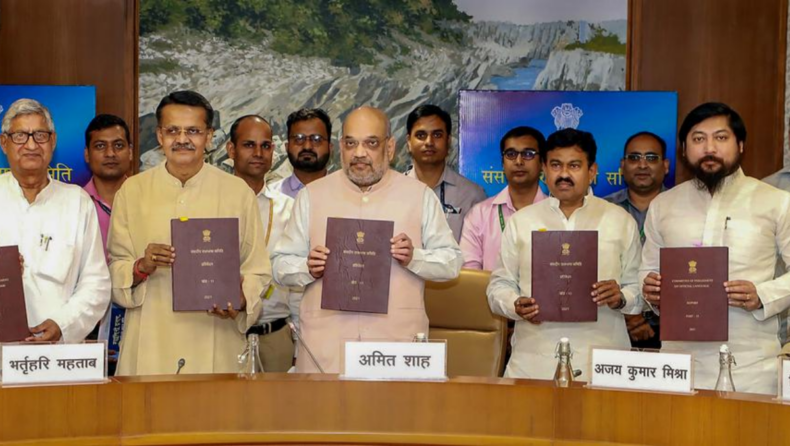The Union Home Minister Amit Shah, on Thursday, 7th April 2022, said that the spoken language of Hindi should be used for communication to increase the importance of the language. Quoting that Hindi is the ‘the language of India’, the union minister said the citizens from the different states of India should use Hindi to communicate with each other.
Urging that Hindi should be accepted as an alternative to English, Shah said that the time has come to make the official language (Hindi) an important aspect of the country’s unity. Further, he clarified that Hindi should be an alternative to English and not to local languages.
At the 37th Parliamentary official Language Committee meeting, Shah uttered that around 70 per cent of the union cabinet’s agendas were now prepared in Hindi. Sparking controversies, he added that Hindi is the official language of India as India does not have a national language. Though English poses as the official language of the country, he insisted on using Hindi as an alternative to English.
TN is not against Hindi, it is against forcing Hindi.
— RJ Balaji (@RJ_Balaji) June 2, 2019
Knowing many languages is a strength. But that should be by choice and not by imposition.
And here is a deleted scene from #LKG ?? #HindiIsNotTheNationalLanguage pic.twitter.com/lCcqsbRogI
In a statement released by the Union Home Affairs Ministry, Shah stated that Prime Minister Narendra Modi had decided that the language of India (Hindi) would be the medium for running the government to increase the significance of the language.
For the propagation of the spoken language Hindi, Shah said that the language should be made flexible by integrating local language words and republishing the Hindi dictionary.
Urging upon paying more concentration to the Hindi examinations, he said the language of Hindi would now be made compulsory up to class 10 in all eight northeastern states.
Furthermore, the home minister cited that around twenty-two thousand teachers had been recruited in the eight North-eastern states and nine North-eastern tribal communities had converted their dialects’ scripts to Devanagari. He also claimed that all the eight Northeastern states have agreed to make Hindi compulsory up to class X.
ஒரு சிறிய தீப்பொறி காட்டுத் தீயாகி இருக்கிறது. இந்தித் திணிப்பு என்பதை எதிர்க்கும் சட்டைகளை வெளியிட்டபோது யாரும் எதிர்பாராத அளவு இது இளைஞர்களிடம் வரவேற்பு பெற்றிருப்பது மகிழ்ச்சியளிக்கிறது. இந்தத் தலைமுறையும் மொழி உணர்வில் சளைத்ததல்ல.#ஹிந்தி_தெரியாது_போடா #StopHindiImposition pic.twitter.com/NIzA1DmYVb
— Kanimozhi (கனிமொழி) (@KanimozhiDMK) September 6, 2020
During the meeting, he also approved the 11th volume of the Official Language Committee report which is now to be sent to the President of India. To ensure the implementation of all 11 reports, he recommended constituting an implementation committee after meeting with all secretaries.
Apart from the Union Home Affairs Minister, Vice-Chairman of the Official Language Parliamentary Committee Bhritahari Mahtab and Union Ministers of State for Home Ajay Kumar Mishra and Nishith Pramanik were present among other members at the meeting.
Soon after the press release from the Home Ministry, arguments and controversies flared up in the country. Southern states of India, stubborn opposers of Hindi imposition, are now retorting with controversial remarks and statements. Previously, the statements of Amit Shah regarding the significance of the Hindi language received sharp opposition from the southern states like Tamil Nadu, Kerala and Karnataka.
A couple of years back, Shah said on having a language for the whole country – that should become the identity of India globally and that language should be Hindi – had picked momentum quickly gaining massive conflicts. Even the launching National Education Policy was surrounded by disagreements as it implements the three-language formula which was vigorously opposed by the southern states.
Many such incidents of Hindi imposition have taken place in the country that resulted in numerous disputes and debates, icy remarks from popular faces and social media hate and trolling. These outcomes were perceived by many as a hate for the Hindi language but it has been constantly clarified by the southern states that it does not hate the Hindi language but it is the hate over the imposition of the language.
Today at the airport a CISF officer asked me if “I am an Indian” when I asked her to speak to me in tamil or English as I did not know Hindi. I would like to know from when being indian is equal to knowing Hindi.#hindiimposition
— Kanimozhi (கனிமொழி) (@KanimozhiDMK) August 9, 2020
Published By :- Shubham Agarwal
Edited By :- Kritika Kashyap













